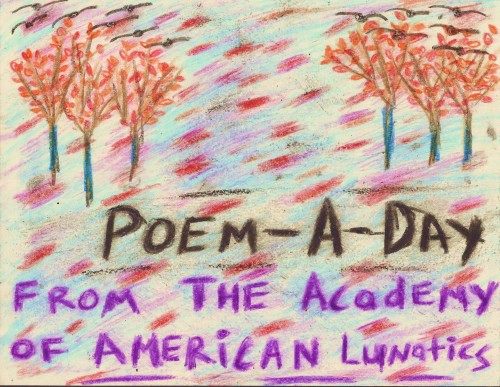over at her Tumblr Thais Benoit, answering a call from Alt Lit Press, offers up a kind of manifesto of thoughts about and definitions for Alt Lit:
“Writing that is happening outside of traditional publishing, mostly online and in digital forms.”
“Alt Lit fits in perfectly with historical literature context. Alt Lit is challenging the norms of the past, and can be compared/contrasted easily to the Beat movement of the 60s. We see authors using their lives as the set of their writing. Allen Ginsberg, Jack Kerouac did things (many of which seemed taboo or ‘wild’ or eccentric) and then wrote about them, and they wrote about them in a way that was real to their readers at the time. Please compare Taipei to On The Road: it’s fun.”
“More than anything else, Alt Lit fills a hole created by the commercial publishing industry. ”
“works by authors such as Jonathan Franzen and Zadie Smith, do not connect with many readers today. . .
WE DO NOT IDENTIFY.
WE DO NOT IDENTIFY.
WE DO NOT IDENTIFY.”
read Thais’ entire post here
Seattle’s Cheese & Wine Poetry Community / The Cult of Henry Darger / etc / etc / (talking with Rebecca Loudon)
Rauan: Seattle’s a polite town. Everyone’s super polite, cordial, in a way, cool in their dealings. But not so warm all the time. Seldom even maybe. What do you think of this? And do you think Seattle’s writing (poetry, etc, whatnot) suffers and/or benefits from a similar sort of politeness? Coolness?
Rebecca: Seattle used to be considered a “friendly” town but Seattle grew up and is now a Big City. Seattle suffers from a kind of passive/aggression. I’ve seen people at six way stops get out of their cars and start fighting over who goes first. We also have a lot of homeless displaced people here but they are mostly ignored or hidden so the city will look prettier. Seattle is famous for leading the way in cutting down its carbon footprint but the city’s largest private employer makes airplanes. No one (at least publicly) acknowledges how jet fuel which emits carbon dioxide and other greenhouse gases into the atmosphere at an alarming rate contributes to the acceleration of global warming. And yet you can no longer get paper or plastic bags at Seattle stores because it’s bad for the environment.
Seattle writers are friendly among themselves those writers who write similar poems those writers who are polite whose poems are polite whose work doesn’t take risks whose poems are widely published in polite poetry journals. It’s an easy place to be a poet. You can’t swing a contrabassoon without hitting a poetry reading in Seattle. This city has supported poetry on buses poetry readings for the city council poetry readings in museums and offers all kinds of grants and opportunities to poets who write polite non-threatening poetry. Sometimes Seattle gets lucky and brings in outside poets to read but mostly it’s the same circle of poets making the rounds being passive aggressively nice with their nice natural fiber clothes their hybrid cars their little hemp bags in which to put their shopping and their polite nice poetry.
*****
*****
Okay, so that was the first part of my latest Seattle Author Spotlight, the 11th, featuring Rebecca Loudon. Several years I did an interview with Rebecca regarding her excellent book Cadaver Dogs (which you can read here, it contains info about her being a violinist as well as some of the very personal elements of that book) but this time I had the pleasure of meeting Rebecca in person. Rebecca claims to be a sort of hermit, but we got along great, intensities coming and going. And Rebecca’s work as I’m finding out is getting stranger and stronger READ MORE >
November 5th, 2013 / 10:52 am
Edmund Berrigan’s Can It!
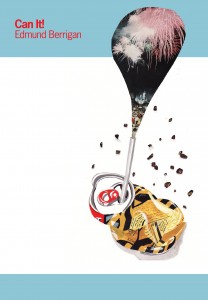 Can It!
Can It!
by Edmund Berrigan
Letter Machine Editions, 2013
169 pages/ $15 Buy from Letter Machine Editions or SPD
The first time that I read the title of Edmund Berrigan’s bold book Can It!, I misread the words as a syntactical anomaly. The words seemed to combine a common inquiry (“can it . . .?”) with aggressive, declarative punctuation. This removed the deferential, cautious quality from Can It!, while adding an insistence that did not negate the underlying doubt; Can It! was a juxtaposition of the curious and the angry and a coexistence of blunt assertion and self-reflexive wonder.
Far from being an error, my misreading of Berrigan’s title served as an avenue into the text, which embodies many of the same concerns as the near-paradoxical titular wording. Can It! is at once an intimate and touching memoir of Edmund as a child and a young man as he experiences the death of his father Ted Berrigan, the later death of his stepfather Doug, and lives as a growing artist in New York City. Can It! is also a fully realized post-Language-School work, sections of which strive to tear apart Berrigan’s established personae and voices, and a playful tribute to the avant-garde surrealist aesthetic that was ushered into America nearly a century ago (and which seems to be experiencing a contemporary renaissance). These styles and traditions jumble together from section to section and form a whole that is rife with Whitman-esque contradictions and pleasantly revels in its inability to be pinned down in genre or intent.
Berrigan’s ability to create pathos while deftly narrating personal development is displayed in a diary entry dated “8/6” (the year is not specified) within the “San Francisco Diary” section:
person, maybe too nice for where I’m at right now. I feel a
certain amount of darkness, I guess, and I need to feel it back.
I also feel like I should have had a real and long relationship
with someone by now, but something always gets in the way.
Me. I’m continuously chasing my tail for no good reason (39).
Compare the ostensible sincerity of that entry with one of Berrigan’s more Language-influenced passages:
walked last night through another pity. Pity throughout the
submarine lumber. ⅓ pity throughout the submarine lumber.
⅔ bivouac in the community. ¾ angle on the burning sphere
of gases in space. ¼ halted vagabonds. I’ve been waltzing and
lambada through the community (29).
Throughout the recurrent instances of sections such as these, Berrigan weaves the notion of language’s flexible mutability—just as a book can trade one influence or style for another, so can swaps and surprises take place within language. Within many of the later poems of Can It!, the playful aspects of language are emphasized—predictable nouns are replaced with other nouns, whether childish or profound. Using a technique that pushes these sections towards the previously mentioned surrealism, Berrigan repeats bits of language (whether lines or phrases) throughout a prose section/poem, or even between two different poems. Such effects maintain the shifting affects of Berrigan’s work. In part 3 of the section “The Ball-Hallelujah Connection,” he writes:
Melty became the most hated artist in
Fork Spindle Divisions
for choosing the most mundane
subjects, melt using a mechanical device
to fraction sorrow so as to remove all human expression
from his work (115).
November 4th, 2013 / 11:00 am
Imperial Nostalgias by Joshua Edwards
 Imperial Nostalgias
Imperial Nostalgias
by Joshua Edwards
Ugly Duckling Presse, April 2013
96 pages / $15 Buy from UDP or SPD
Joshua Edwards begins Imperial Nostalgias with two short parables. One tells the story of a Traveler, another of an Outsider. The poems are immediately evocative and irresistible in the tradition of Italo Calvino and his Invisible Cities, or more recently Srikanth Reddy’s take on Dante. From there, Edwards wades into cinematic territory in a series of photos. These describe a journey through a “Valley of Unease.” We see ruins, a stray dog, and a bonfire at night.
The third section, a prose poem called “Departures,” is the strongest in the collection. The travelogue model works as a compelling framework to satirize and embrace American anxieties in “slightly foreign” lands. The poet approaches Imperial Nostalgias with clear eyes. In an interview earlier this year with the Studio One Reading Series he admitted, “Imperialism is in the cereal I eat and the culture I consume, and the ghost of Manifest Destiny looms large in the histories of the states I’ve spent most of my life in.” Like Ben Lerner’s terrific Leaving the Atocha Station, the work engages the aesthetics and the ambivalence of young Americans abroad.
Edwards works through anxieties, but he still perpetuates the myth that there is such a place as “abroad.” So while there is little talk of the cringey Tinker, Tailor, “These boys were born to empire,” type nostalgia in the collection, there is still a very clearly articulated imperialist nostalgia. This comes out in snatches,
I wake up and then drink tea, then relax
On my friends couch to watch Paris, Texas
For the first time. When someone goes silent,
Or when a siblings room is filled with sorrow,
The whole world resembles a motel room.
Edwards chooses a very particular aesthetic (He evokes French minimalists like Toussaint, art galleries, (Like Lerner, Imperial Nostalgias repeatedly returns to art museums as if too say this too is a high concept endeavor), washed out desert scenes, vague Orientalism, Paris, Texas, etc) that effectively conveys a certain moment in American (therefore world) history: 80’s independent film and Conceptual Art.
In the translation of this aesthetic, Edwards shows a drive towards the mysterious and apophatic. When Bell Hooks wrote about Imperialist Nostalgia, she focused on celebrities like Madonna, performing blackness. She employed the now well-worn “eating the Other” type analysis. But really, it’s important to remember there’s a lot of Other there (too much to eat), and in terms of nostalgia this comes out in the apophatic or the unknowable. For 80’s Conceptual Art or even Paris, Texas, the mystery deepens as it ages. And difficult to decipher social orders become conflated with truly the truly unknowable. The work of Cindy Sherman, or Vancouver School Photographers, lately much celebrated and mimicked, have taken on a sheen of romance. And this says something about conceptual photography in the 80’s and a whole lot more about the way we live now. It’s common for artists to romanticize and re-imagine the past, but this has everything to do the artist’s personal contemporary.
For artists of a certain generation Paris, Texas becomes a type of nostalgic touchstone; it represents not a time before there was American empire, but perhaps before the artist knew about American empire. The unknown swirling around Harry Dean Stanton would be a lot less unknown for an older generation of filmgoers that had seen him act in movies beginning in the 1950’s. In a recent HMTLGIANT post, Felix Bernstein imagines art “that may or may not know (symbolic order) networks exist.” Paris, Texas is a beautiful film, certainly nostalgic for great Cowboy and Noir films of an earlier era, but the complex social networks it explores (poverty in the panhandle, cold war malaise) might be different for an older artist living in Houston, for example. Recognizing the precarious position of a would be counter-cultural American artist abroad, Edwards compulsively recreates an aesthetic of the Imaginary or in-between, when the startling symbolic order networks do not exist for him, but not an aesthetic from when they did not exist. And by translating this aesthetic again and again, Edwards is free to play Cowboys and Indians.
***
Joseph Houlihan lives and works in Minneapolis, MN.
November 4th, 2013 / 11:00 am
POEM-A-DAY from THE ACADEMY OF AMERICAN LUNATICS (#2)
by Seth Abramson
This is a world where there are poets
There are poets everywhere, neo-formalists and conceptualists
There are poets on Twitter, there are poets in my bed.
There is one poet. She is my little one.
I talk to my little poet.
I give my little poet some Stevia but that does not satisfy her.
I tell her, ssh ssh, don’t growl little poet!
And she growls, oh boy does she growl!
And she wants something from me,
She wants my soul.
And finally giving in, I give her my gleaming soul
And as she eats my gleaming soul, I am one with her
And stare out her eyepits [sic] and I see nothing but white
And then I see nothing but fog and the white I had seen before was nothing
but fog
And there is nothing but fog out the eyes of poets
![]()
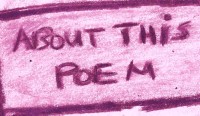 When I was six or seven, I skinned my knee. It’s an experience that’s never really left me. This is a poem about that. And the magic of poetry. It’s called “Ars Poetica,” which means “small gift” in Latin. This poem owes a significant debt to Dottie Lasky and also to the magic of poetry.
When I was six or seven, I skinned my knee. It’s an experience that’s never really left me. This is a poem about that. And the magic of poetry. It’s called “Ars Poetica,” which means “small gift” in Latin. This poem owes a significant debt to Dottie Lasky and also to the magic of poetry.
![]()
note: I’ve started this feature up as a kind of homage and alternative (a companion series, if you will) to the incredible work Alex Dimitrov and the rest of the team at the The Academy of American Poets are doing. I mean it’s astonishing how they are able to get masterpieces of such stature out to the masses on an almost daily basis. But, some poems, though formidable in their own right, aren’t quite right for that pantheon. And, so I’m planning on bridging the gap. A kind of complementary series. Enjoy!
November 4th, 2013 / 12:01 am
“Perhaps if I avoid critical reviews (not merely negative ones), what I acknowledge is that I am afraid that I will actually be read carefully, deeply, and that the results will complicate my endeavor. But surely a complication of that sort could materialize (with any luck) in one’s very next poems. It might improve them.”
— Joshua Marie Wilkinson’s thoughts on poetry criticism over at The Volta are I think legitimately splendid, of a shiny clarity, and they make me feel shitty about how often I’ve let opportunities/invitations to do more nuanced critical work slip by because they promised to take more time/work than manic imploring.
Brando, My Solitude: A Biographical Hypothesis
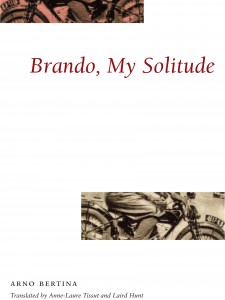 Brando, My Solitude
Brando, My Solitude
by Arno Bertina
Counterpath, Feb 2013
104 pages / $14 Buy from SPD or Amazon
Expectations, whether we like it or not, are typically the prime criteria people use to judge a work. They are the drive that propels us to even entertain the notion of diving into someone’s or some group’s creative endeavors to see if it proves enjoyable for us to consume. Movie trailers reconstruct segments of film under dramatic vein-twisting music to pull people into theaters by building expectations inside them. Agents tell novelists to get on twitter and be witty hoping for similar implanted affects. The trouble with these generated expectations in regards to literature in the modern day is that the market is so inundated with worthwhile and not-so-worthwhile work that the attention grabbing moves to the forefront of concerns, and, I can only speak for myself, but it conditions me to move on to something else if I don’t immediately like what I’m reading, or, in other words, if my expectations aren’t met. But underneath these battles of persuasion between personas and publishing houses lie modest works not meant for the fast-paced tastes of surface culture, works that transcend quick blurbs, ones so unconventional that distilling them into advertisements wouldn’t only prove insulting, but impossible, because their effects struggle to find correct wording.
Brando, My Solitude is just such a work that defies easy marketing, and by that I mean it’s truly a great book that slowly leads one deeper into its text, leaving space open to confound the reader with doubts before subtly working its magic. It’s the kind of book that expectations would kill; I found myself wondering at first if it was worthwhile to finish. Roughly the first twenty pages is a swirl of non-chronological, tangential narrative of a family, focusing on a nameless middle child, written in promising prose that show the signs of a good writer (and/or in this case translators). The narrator, the main character’s great-nephew, reveals himself as an unreliable biographer, one prone to uncertainty and honest vulnerability from a lack of facts or simply being there. A recounting of the events in the story would be boring and, frankly, useless, because it’s not the plot that really makes this story come alive, it’s the narrator’s perception and imagination on the facts given to him about his great-uncle.
The aspects of the main character’s life that are most interesting are the holes of mystery that cannot be filled. As the narrator says, “in this story hints are vehicles widely open to the wind, blowing in the fictions people most want to believe.” What reflects back on us as readers in this story are our assumptions on questionable events, our expectations of the most corrupt of human intentions driving the characters’ actions, for instance, the questionable births of both the main character’s and his wife’s children, each one possibly stemming from their respective supposed infidelities.
The truth of a life, after all, after all is said and done at the point of permanent death, are only the perceptions of others on the one in question, and his or her personal artifacts. The man in focus in this story is mythologized by his great-nephew for his freedom to stand in the face of provincial bigotry, cultural conventions, and familial behind-the-back whisperings on morality. The meaning of the title comes revealed to us through a personal journal, coded in Russian, as if locked away for its revealing nature by the man in question, on how he saw something outside of himself in another’s eyes that ultimately reminded him of his own personal plight through life. As the character ages, his eccentricities abound in the furthering expansion of his own solitude, and what we come to discover is that what truly makes a person who he or she is, are these eccentricities that too frequently get locked away, hidden from public light, the ones only allowed to flourish too late in life.
November 1st, 2013 / 11:00 am
A Far-Shining Crystal by Whit Griffin
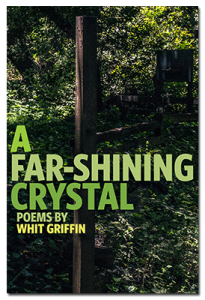 A Far-Shining Crystal
A Far-Shining Crystal
by Whit Griffin
The Cultural Society, 2013
70 pages / $15 Buy from SPD or The Cultural Society
…you can’t escape history – whatever you do, history informs and shapes you and your concept. Maybe to some degree you can push something somewhere, because all of our brains are unique structures of nature you can’t even play a lick like somebody else did, even if you’re expert at copying somebody what you’re doing is different by the nature of your brain chemistry. So all that’s to say that you can’t escape history because it presses down and weighs on you, the whole history of the universe, and it is also – I don’t want to say it’s moving forward because it’s not going anywhere, it just IS – but it is now.
– Matthew Shipp
Widely engaging, Whit Griffin confronts history as if a parlor trick turned serious. His poems offer counsel which surprises and confounds, conjuring disparate items of new and old lore at will. Griffin mixes together a celestial grab bag of cross cultural myth and magic presenting a head spinning engagement with what’s more or less generally recognizable as occulted literature. The structural supports he relies upon in terms of content are at once both factual and imagined. This poetry both is and is not a guide to esoteric knowledge. In Matthew Shipp’s words, “it’s not going anywhere, it just IS – but it is now.” Griffin reaches out to grab anything and everything speaking to the moment of the poem. He relentlessly spins the wheel of reference, plucking off correspondences as needed in an inspired bit of poetic magicking.
Collaging together lines heavy with symbolic imagery, Griffin tests intuition against imagination. Under Griffin’s care the affair of writing poems turns into an alchemical sleight of hand. The poems are listening to themselves go, line-by-line propelling a state of constant revelation yet refusing to reveal anything. Every set of lines are rungs of a ladder which lead only to further rungs. There’s plenty here for readers, along with the poet, to disappear into again and again. A revisiting ritual gets enacted on every page. Peel back one layer and you find yourself peeling it off again a few pages later.
These poems arrive full of many talismans. “Stone” is one of many words which, appearing throughout in individual lines and titles of poems, comes to take on properties similar to the sigil. For instance, there’s a poem, “Stone Called Jet” opening “As Blake is to yellow…” and in the poem “Bigger than the Material” mid-line we find: “A stone is a swifter.” While in a poem entitled “The River of Milk, the Snake Canoe” we get the following informative and detailed info:
out of stone. The force that formed the
stone can also dissolve it. Bacchus turned
the amethyst red. No god, but the translator,
turned Andromeda into a dromedary.
Tamberlane’s tent turned from white to red.
Red stones do not appeal to idealists. Roman
widows wore white. Rosicrucians believe iron
is the product of dark powers. The sly fox in
sympathy with the wily god. The lame god
is the provider of all good things.
The poem rolls on as one reference folds into the next, in the process unfolding one meaning in order to form another. Each line sparking off the one previous, springing a new set of thoughts reaching yet further afield as the poem runs down the page. Later this same poem tells us “There are seven amulets known / to all seafarers.” Continuing on to mention many specific stones: jade, coral, sapphire, turquoise, malachite, crystal, and the relations of stone-like objects: “Every tree trunk becomes a gnomon. Lost a gnomon, / gained a swearing hole.” The mark left by way of a protruding absence. There’s then a turn towards listing incredible what-if occasions, such as “To stroll with William Blake himself, and hear him speak / of the icelike Yuccas.” Before ending, “When he died his skull became the sky.” Matter of fact truth laid bare, plain as day.
November 1st, 2013 / 11:00 am




